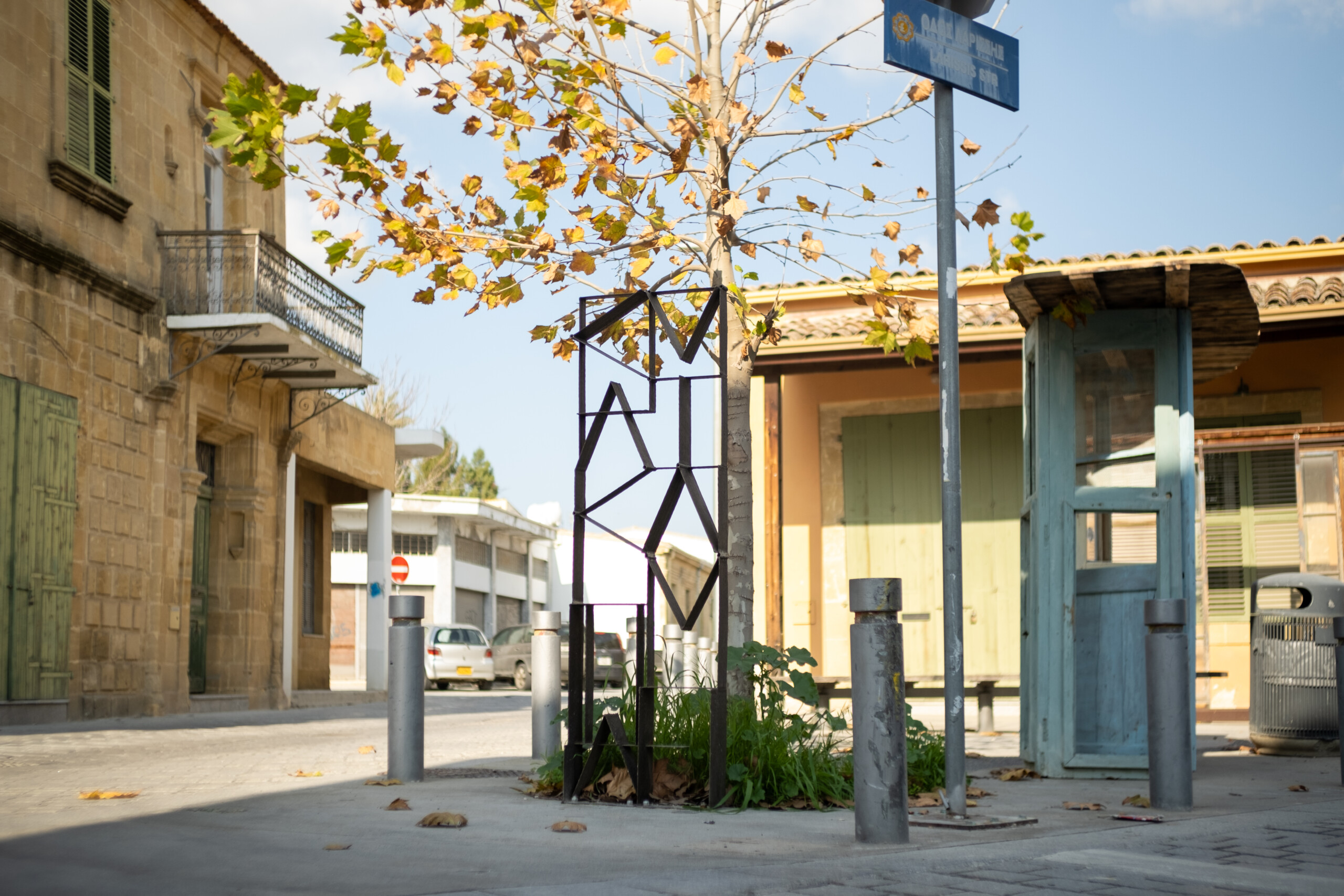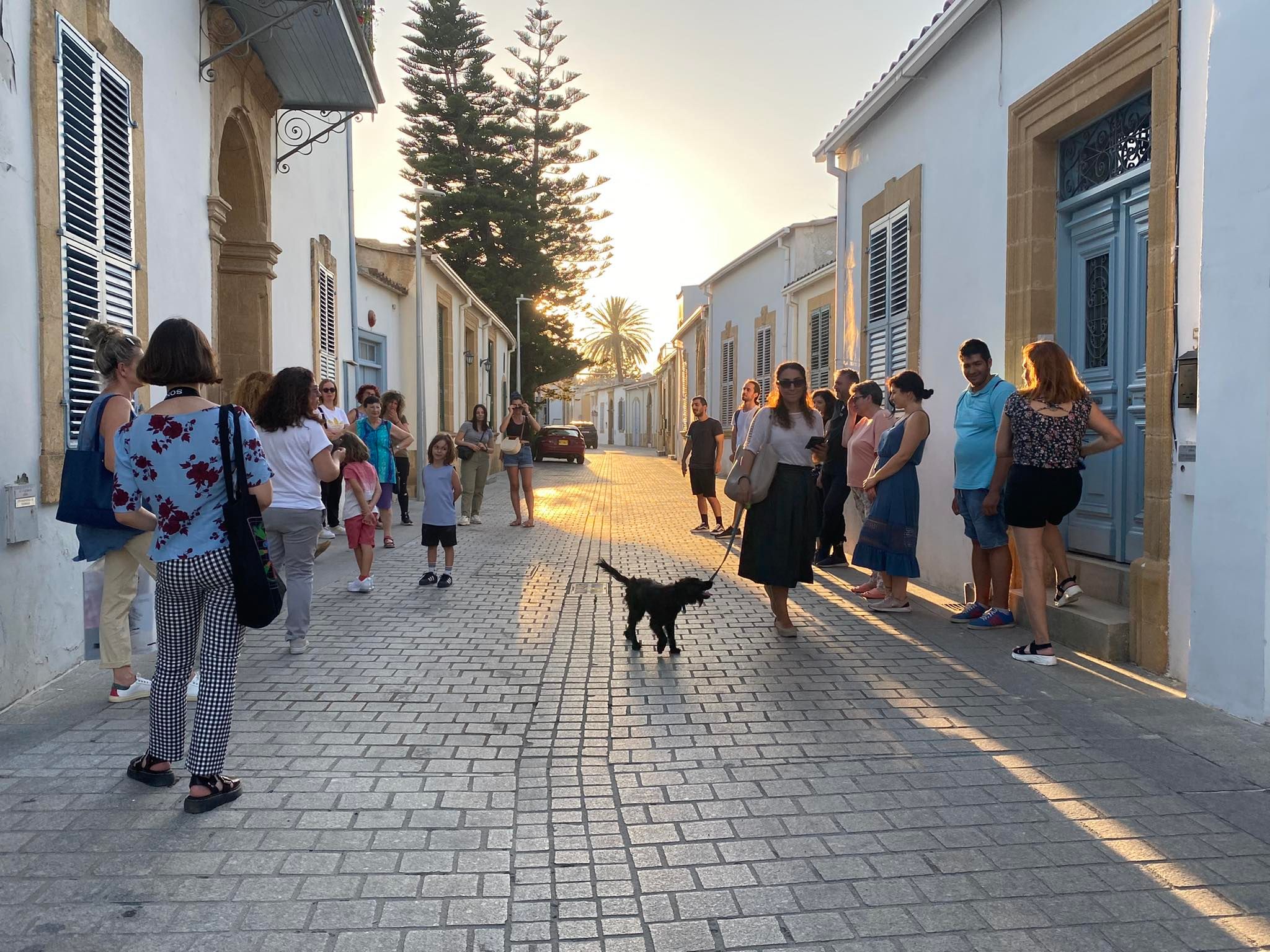Our Story
The Pame Kaimakli Festival began in 2013 as a small, resident-led initiative to bring new life to one of Nicosia’s oldest neighbourhoods. What started as a few informal gatherings and performances quickly revealed the power of community through events such as opening doors, sharing courtyards, and turning familiar and unfamiliar sites into experiential places of encounter. Since 2017, the non for profit organisation Urban Gorillas has worked alongside residents, artists, and volunteers to shape the festival into a unique annual event. For a few days each year, Kaimakli becomes a living stage: streets become theatres, rooftops transform into cinemas, courtyards host concerts and workshops, and even abandoned houses are re-imagined as spaces for art and dialogue.

Perspective
Pame Kaimakli

Pame Kaimakli is a collective effort to celebrate community, nurture creativity, and make public space open and accessible to all. Pame Kaimakli is an annual community arts festival that celebrates life in the neighbourhood through creativity, collaboration, and shared public space. Each year, the festival transforms Kaimakli into an open-air network of events — performances, exhibitions, workshops, and installations — hosted in peoples’ houses, in streets, courtyards, rooftops, garages, and along the buffer zone of our divided neighborhood.
Artists from Cyprus and abroad work closely with residents to co-create site-specific projects that reflect the stories, diversity, and rhythms of the area. At its core, Pame Kaimakli is about bringing people together — neighbours, visitors, and artists — to imagine and experience the living in the city differently. It is a curatorial experiment in community-making, where art becomes a tool for dialogue, participation, and belonging. For a few days each year, the neighbourhood opens up as a shared space of creativity and connection, reminding us that culture starts where people meet.

Neighbourhood
Kaimakli, Nicosia

Kaimakli is one of the oldest and most characteristic neighbourhoods of Nicosia. It is located near the Venetian walls of the city centre and along the United Nations buffer zone that has divided the island since 1974. Once extending across the buffer zone, the area today lies within the Greek-Cypriot municipality of Nicosia. It is distinguished by its narrow streets, stone-built houses with interior courtyards, and traditional neoclassical architecture — features that have earned it the designation of an “Area of Special Character” by the Department of Planning and Zoning.
Historically a quiet residential area, Kaimakli has undergone a gradual demographic transformation over the past fifteen years. Alongside long-time residents, the neighbourhood has welcomed new communities — migrants from Africa, Syria, and Lebanon, as well as young Cypriot and European artists, designers, and professionals drawn by its affordable housing and distinctive character. Despite its social diversity, everyday interaction among residents remains limited, partly due to a lack of public gathering spaces.
The festival responds to the neighbourhood’s need for shared spaces, creating opportunities for residents and visitors to connect through art, participation, and collective celebration.

Festival Team
Curators
Veronika Antoniou
Architect, urban designer, and cultural manager, Veronika Antoniou connects research, creative practice, and public participation. Co-founder of Urban Gorillas NGO, she has led numerous EU-funded projects and curated community-driven cultural programmes that activate public space across Cyprus and Europe. Her work focuses on participatory urbanism, social innovation, and the transformative role of creativity in public spaces in shaping inclusive cities. She also holds a PhD from the University of Tokyo where she has investigated the role of grassroots collectives in forming and sustaining urban commons.
Veronika Antoniou
Architect, urban designer, and cultural manager, Veronika Antoniou connects research, creative practice, and public participation. Co-founder of Urban Gorillas NGO, she has led numerous EU-funded projects and curated community-driven cultural programmes that activate public space across Cyprus and Europe. Her work focuses on participatory urbanism, social innovation, and the transformative role of creativity in public spaces in shaping inclusive cities. She also holds a PhD from the University of Tokyo where she has investigated the role of grassroots collectives in forming and sustaining urban commons.
Yiorgos Hadjichristou
Architect, professor, and founder of the Pame Kaimakli Festival, Yiorgos Hadjichristou bridges practice, teaching, and activism. A long-time Kaimakli resident, his work explores architecture as a social and civic act, shaping spaces that invite encounter and belonging. He has participated in the Cyprus pavilion at the Venice Architecture Biennale multiple times and received international recognition for his architecture projects.
Yiorgos Hadjichristou
Architect, professor, and founder of the Pame Kaimakli Festival, Yiorgos Hadjichristou bridges practice, teaching, and activism. A long-time Kaimakli resident, his work explores architecture as a social and civic act, shaping spaces that invite encounter and belonging. He has participated in the Cyprus pavilion at the Venice Architecture Biennale multiple times and received international recognition for his architecture projects.
Teresa Tourvas
Architect, researcher, and cultural manager, Teresa Tourvas works across design, academia, and community projects exploring collaboration, public space, and social sustainability. A graduate of MIT, she combines research with hands-on engagement through participatory and artistic projects across Europe and Asia. As co-curator of Pame Kaimakli, she brings a curatorial approach that merges design experimentation with social interaction, transforming ordinary spaces into places of exchange and imagination. She is currently a PhD candidate at the University of Sheffield, researching the intersection of the urban commons and social housing.
Teresa Tourvas
Architect, researcher, and cultural manager, Teresa Tourvas works across design, academia, and community projects exploring collaboration, public space, and social sustainability. A graduate of MIT, she combines research with hands-on engagement through participatory and artistic projects across Europe and Asia. As co-curator of Pame Kaimakli, she brings a curatorial approach that merges design experimentation with social interaction, transforming ordinary spaces into places of exchange and imagination. She is currently a PhD candidate at the University of Sheffield, researching the intersection of the urban commons and social housing.
“The festival creates the space to celebrate publicness and bring artistic and cultural practices to an audience that would otherwise not be involved in such activities. The festival, as a process, and the community dynamics preceding it, also provide an opportunity to initiate a discussion about the creation of a sustainable and socially inclusive neighborhood development.” Yiorgos Hadjichristou
Our Community
Festival Team and Collaborators
Curators: Yiorgos Hadjichristou, Teresa Tourvas, Veronika Antoniou Urban Gorillas Team: Mary Mavrochanna, Eleni Ioannidou, Naile Alanlı, Thanos Stergiou, Andriana Moro Esperidou, Rafael Tsentides Volunteers: Nikoletta Perikleous, Maria Moutafidou, Victor Klinkenberg, Christoforos Pissarides, Anna Thomaidou, Eratw Koromia, Maria Ladommatou, Martha Petrou, Leon Lagoubian. With the support of Kaimakli residents who opened their houses for us wholeheartedly. Photography and Videography : Nafsika Hadjichristou, Andreas Kleanthous, Jonatan Omar Garcia Martinez. Technical Support: Andres Kalli, Michalis Aggeli, Bantares.
Funding
Sponsors & Supporters
















Contact Us
Would you like to learn more?
Say hello
Location
NEWSLETTER







